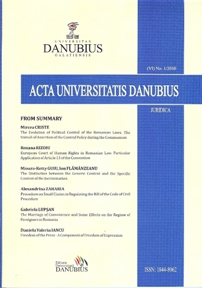The Interpreter’s Attitude Regarding the
Principles of Interpretation. Dworkin vs Hart
The Interpreter’s Attitude Regarding the
Principles of Interpretation. Dworkin vs Hart
Author(s): Claudia AndriţoiSubject(s): Law, Constitution, Jurisprudence
Published by: Editura Universitară Danubius
Keywords: normative demands; interdependence; duality; empirical disagreements; theoretical disagreements
Summary/Abstract: The solving of tensions between judicial naturalism and positivism may lead to conciliation and finally to their rapprochement in a judicial interpretation area. They seem to lead to a greater number of common results in the judicial interpretation domain regarding a real convergence between diverse conceptions of different author or referring to an agreement on a common interest or to a combination between the two variants. From this perspective a judicial interpretation can be qualified as being partial or arbitrary. The principles of interpretation have, mainly, a functional nature. They contain, on one part, an ontological basis, ensured by general law principles, configured from a functional and in a technological-methodological point of view. On the other side, the principles of interpretation, regardless their involvement from an organic point of view can be involved in norm application, without taking a normative form. If they obtain a formal-normative investment they lose their main nature, transforming into norms, but we must have to mention the fact that, the principle guides, enlightens, it does not obligate. They represent values, expressed into ideas, desires, but not norms, because these ones build on principles.
Journal: Acta Universitatis Danubius. Juridica
- Issue Year: 6/2010
- Issue No: 1
- Page Range: 45-56
- Page Count: 12
- Language: English

